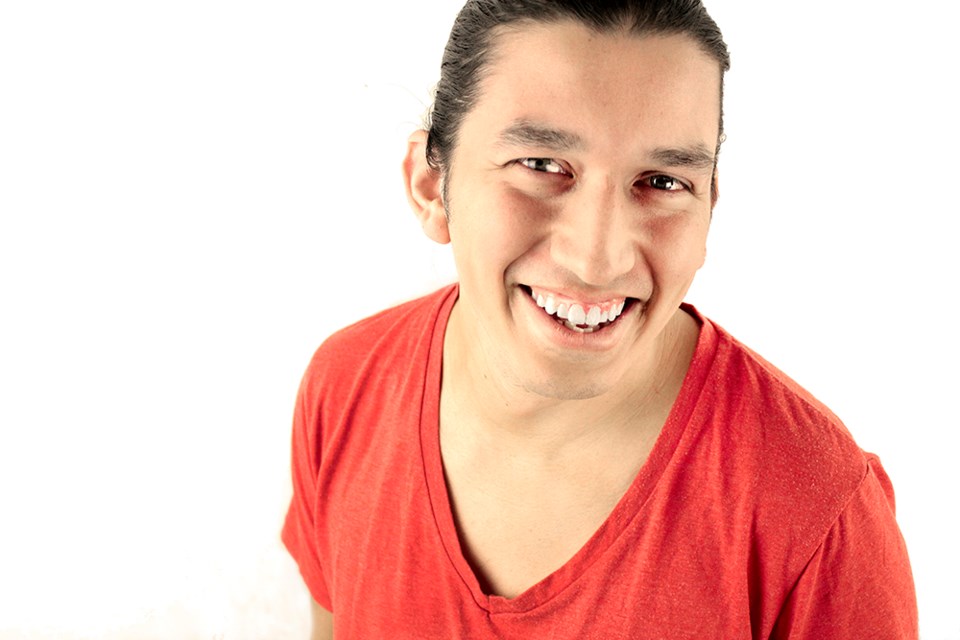Khelsilem, a First Nations educator and artist, owes his respect for the Squamish language to his grandmother.
He lived with her until he was six years old, and she insisted Khelsilem listen for half an hour to taped recordings of Squamish Nation elders speaking and singing in the Squamish language (Skwxwú7mesh Snichim) before he was allowed to watch cartoons or go out and play.
“She instilled in me a love for our language and culture,” he said. “Even though my grandmother was a residential school survivor, she always felt very strongly that her culture and her traditions and her ancestry and beliefs were very important – very needed – in our lives.”
Khelsilem is founder of Skwomesh Academy and president of the associated not-for-profit Kwi Awt Stelmexw group; both organizations are dedicated to revitalizing the Squamish Nation Language. Kwi Awt Stelmexw was recently granted funding to develop a 25-year language revitalization-planning project, creating a Squamish Language action plan.
There are currently seven people who fluently speak Squamish Nation language. Two of the fluent speakers live in Squamish, Khelsilem said.
“We can be a stronger community, a more vibrant community, a more creative community, a wiser community, and all of those things are needed, and language will give us that.”
The plan will be written by a task force that will include Squamish language speakers, youth, elders and two Squamish Nation elected representatives.
“We are going to be meeting regularly and engaging the community to develop a consensus around a shared vision for our language,” Khelsilem said.
The Squamish Nation Trust and the First Peoples’ Cultural Council provided funding for the project.
Cheif Ian Campbell said as a fluent speaker himself, he worries about the decline of the Squamish Nation language.
"It is something that concerns me on a daily basis, and a lot of our efforts [are] to try and correct this trend and create more speakers," he said. "Beyond the Nation, I want to see it celebrated that it is part of the region, that everybody – not only Squamish but everybody who lives in our territory – is going to know some of the history, some of the mythology, some of the words, placenames... and celebrate the history and the connection to this part of the world."
The process of devising a revitalization plan will involve mobilization meetings, round tables, surveys, focus groups, letter writing and regular task force meetings, Khelsilem said.
“It’s about creating a comprehensive plan to create a document that can be used as an advocating tool for future leaders, community members, governments to commit to certain targets that have been identified by our community as it relates to our language,” he said. The main 25-year goal is to rebuild a community of fluent Squamish speakers.
Khelsilem said for the Squamish people, it is a relatively new phenomenon for the language not to be thriving.
“We have existed with our own laws, governance, responsibilities, our own rights and responsibilities – we have existed as a people that are unified by lineage, culture and tradition and for the extent that we have been in existence on our lands, we have been Squamish language speakers,” he said. “It has only been in the last 150 years that that is not the case, and so we have a decision to make about who we are going to be as a nation. Are we going to be the generation that completely changes our narrative from one where our people have always been speakers of our language to letting it die?”
Khelsilem’s Skwomesh Language Academy operates under the parent Kwi Awt Stelmexw organization. The Skwomesh Academy is building towards offering a six-month full-time language immersion program starting in September 2016; it will be for adults under 35 of Squamish Nation ancestry. The goal is to create 15 fluent speakers per year, Khelsilem said.
“We have gone through a lot of challenges and we have been impacted negatively by a lot of the things that have been forced upon us by colonial policies, and the thing about language revitalization is it is one of many things that can bring our community back together and restore the structure of belonging that we once had,” he said.
“There are certain things we are going to face for the rest of our existence, and only community can deal with those things.”
For information on the academy, go to squamishlanguage.com
**This story has been updated with additional comments since it was first published.




